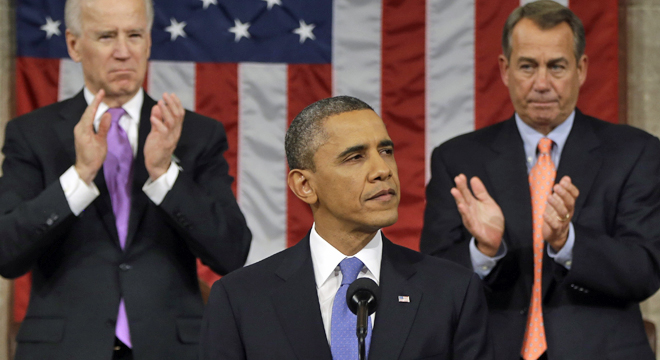Hours before sequestration spending cuts kicked in on Friday night, President Obama and House Speaker John Boehner made separate remarks about their shared desire to avoid a government shutdown.
Boehner even spoke in optimistic terms. “I’m hopeful that we won’t have to deal with the threat of a government shutdown,” he told reporters.
But their statements instilled a false sense among observers that the fight over sequestration won’t morph in the coming days into a full-scale government shutdown brawl.
At issue is whether the Republicans’ funding measure to keep the government running (known as a continuing resolution) will violate an agreement they reached with the Obama administration in summer of 2011, which set overall funding levels for both defense and non-defense annual spending.
The Obama administration wants to preserve that agreement, and apply sequestration’s spending cuts to the consensus funding levels.
“We agreed to a certain amount of money that was going to be spent each year, and certain funding levels for our military, our education system, and so forth,” Obama said. “If we stick to that deal, then I will be supportive of us sticking to that deal.”
But the implementation of sequestration, particularly its indiscriminate cuts to defense programs, calls into question whether House Republicans will be able to honor the government funding deal without relying on a significant number of Democratic votes. Republicans want to restore some funding to defense programs to mitigate sequestration’s impact on GOP priorities. And that could leave Boehner to choose between keeping his conference united — and thus passing a continuing resolution that the Senate and White House reject — or ignoring internal GOP politics and teaming up with Democrats to keep the government open.
According to Politico, “House Republicans are proposing this week to restore upward of $7 billion to operations and maintenance accounts for the four military services hit hard by the automatic cuts that went into effect Friday night. … The measure will keep in place the overall spending reduction known as the sequester ordered Friday. But in the case of the Defense Department, it substitutes an updated full-year budget that shifts money to address the GOP’s great Achilles’ heel: the serious danger to military readiness if the standoff with President Barack Obama drags on for months.”
Democrats are unlikely to accept such a proposal unless Republicans agree to make similar allowances for domestic programs. Likewise, according to a senior administration official, the White House will not support a continuing resolution that turns sequestration’s lower spending requirements into a new appropriations baseline. The demand may sound technical but is a big part of the administration’s sequestration strategy.
The House measure, scheduled to be unveiled Monday, will indicate whether the parties are on a government shutdown collision course, and thus play a major role in determining how the fight over sequestration unfolds.










